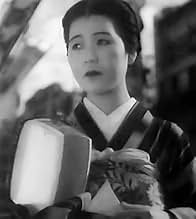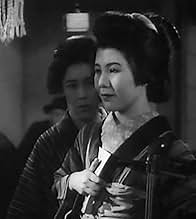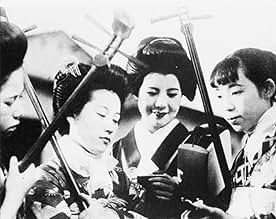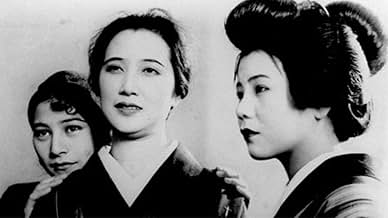IMDb RATING
7.1/10
281
YOUR RATING
Three sisters earn money by being street musicians. A number of loosely linked episodes ensue as the sisters who have different characters, variously become involved in the world of criminal... Read allThree sisters earn money by being street musicians. A number of loosely linked episodes ensue as the sisters who have different characters, variously become involved in the world of criminals, sacrifice themselves and find love.Three sisters earn money by being street musicians. A number of loosely linked episodes ensue as the sisters who have different characters, variously become involved in the world of criminals, sacrifice themselves and find love.
- Director
- Writers
- Stars
Masao Mishima
- Bad boy at Rokku
- (uncredited)
Jun Ôtomo
- Bad boy at Rokku
- (uncredited)
- Director
- Writers
- All cast & crew
- Production, box office & more at IMDbPro
Featured reviews
Naruse's THREE SISTERS WITH MAIDEN HEARTS remains one of the most inventive and original early sound films made anywhere; its usage of voice-over, sound effects, and music to amplify the basic narrative is extraordinarily sophisticated. It's also one of Naruse's most poignant films, with its story of three sisters and their travails as traveling musicians. It's very little known, but deserved to be more widely seen. This film is also notable as one of the rare instances when Yasunari Kawabata wrote the original screen story; in 1954, Naruse would adapt Kawabata's novel THE SOUND FROM THE MOUNTAINS, but this early collaboration remains an instance where a distinctive literary sensibility was truly represented on the screen.
A soured mothers and two elder sisters deal with a harsh world to try to rear the youngest daughter without their worries. Alas, they cannot succeed.
Mikio Naruse's movie has some issues; he is still trying to deal with movie-making in a fashion that has not caught up with the possibilities of sound. As a result, there is a lot of narration within the movies, explication that would have been handled by a benshi in silent days. Nonetheless, as the mother sours as the elder sisters chafe at the demands on them -- including streetwalking -- the younger sister finds a man who is kind, but cannot protect her from the world, due to his declining health.
What Naruse accomplishes in this movie is to tell of a sisterly love without words, despite a family that does not work in any conventional sense. The three youngsters express their love through their actions, in their absences, in their urging the youngest to get away. Although it bears little relationship, either in character or themes, it shares some relationship with Naruse's INAZUMA, except in that movie, character and selfish relationships force the protagonist into the realization that what is best for her is to run away; here, everyone does that, because they care about her.
The story was remade by Kon Ichikawa in 1983 as THE MAKIOKA SISTERS.
Mikio Naruse's movie has some issues; he is still trying to deal with movie-making in a fashion that has not caught up with the possibilities of sound. As a result, there is a lot of narration within the movies, explication that would have been handled by a benshi in silent days. Nonetheless, as the mother sours as the elder sisters chafe at the demands on them -- including streetwalking -- the younger sister finds a man who is kind, but cannot protect her from the world, due to his declining health.
What Naruse accomplishes in this movie is to tell of a sisterly love without words, despite a family that does not work in any conventional sense. The three youngsters express their love through their actions, in their absences, in their urging the youngest to get away. Although it bears little relationship, either in character or themes, it shares some relationship with Naruse's INAZUMA, except in that movie, character and selfish relationships force the protagonist into the realization that what is best for her is to run away; here, everyone does that, because they care about her.
The story was remade by Kon Ichikawa in 1983 as THE MAKIOKA SISTERS.
Naruse Mikio's Sannin-shimai is a down-to-earth description of life in Tokyo in the 1930s when both Japan and most of the world were in economic depression. The three sisters at Asakusa, the low-life part of Tokyo, have to work hard for their lives as well as for broken romance.
O-ren, the eldest sister, is the toughest and the first to leave the family and the hahaoya but with much hardship and disappointment. She was followed by the second sister O-some, who is more understanding and more compromising. The youngest sister is the luckiest of them all, being more cherished by Mom when, I suppose, there is less hardship with more saving from the miser and hard-hearted hahaoya during her better life-time.
It is good to see three such otome-gokoro (maiden-hearted) ladies traddling their lives in pre-war Japan and tried best to solve their economic and emotional problems which may be of good relevance to those of us at present who may need to face poor economic environments and possible global breakout of world-wide conflict and or depression in the coming future, such as those in Europe which is full with immigrants from Midde-East or in Japan which is suffering from post-tsunami depression and emotional turmoil.
O-ren, the eldest sister, is the toughest and the first to leave the family and the hahaoya but with much hardship and disappointment. She was followed by the second sister O-some, who is more understanding and more compromising. The youngest sister is the luckiest of them all, being more cherished by Mom when, I suppose, there is less hardship with more saving from the miser and hard-hearted hahaoya during her better life-time.
It is good to see three such otome-gokoro (maiden-hearted) ladies traddling their lives in pre-war Japan and tried best to solve their economic and emotional problems which may be of good relevance to those of us at present who may need to face poor economic environments and possible global breakout of world-wide conflict and or depression in the coming future, such as those in Europe which is full with immigrants from Midde-East or in Japan which is suffering from post-tsunami depression and emotional turmoil.
Did you know
- TriviaMikio Naruse's first sound film.
Details
- Release date
- Country of origin
- Language
- Also known as
- Three Sisters with Maiden Hearts
- Filming locations
- Production companies
- See more company credits at IMDbPro
- Runtime
- 1h 15m(75 min)
- Color
- Aspect ratio
- 1.37 : 1
Contribute to this page
Suggest an edit or add missing content






















